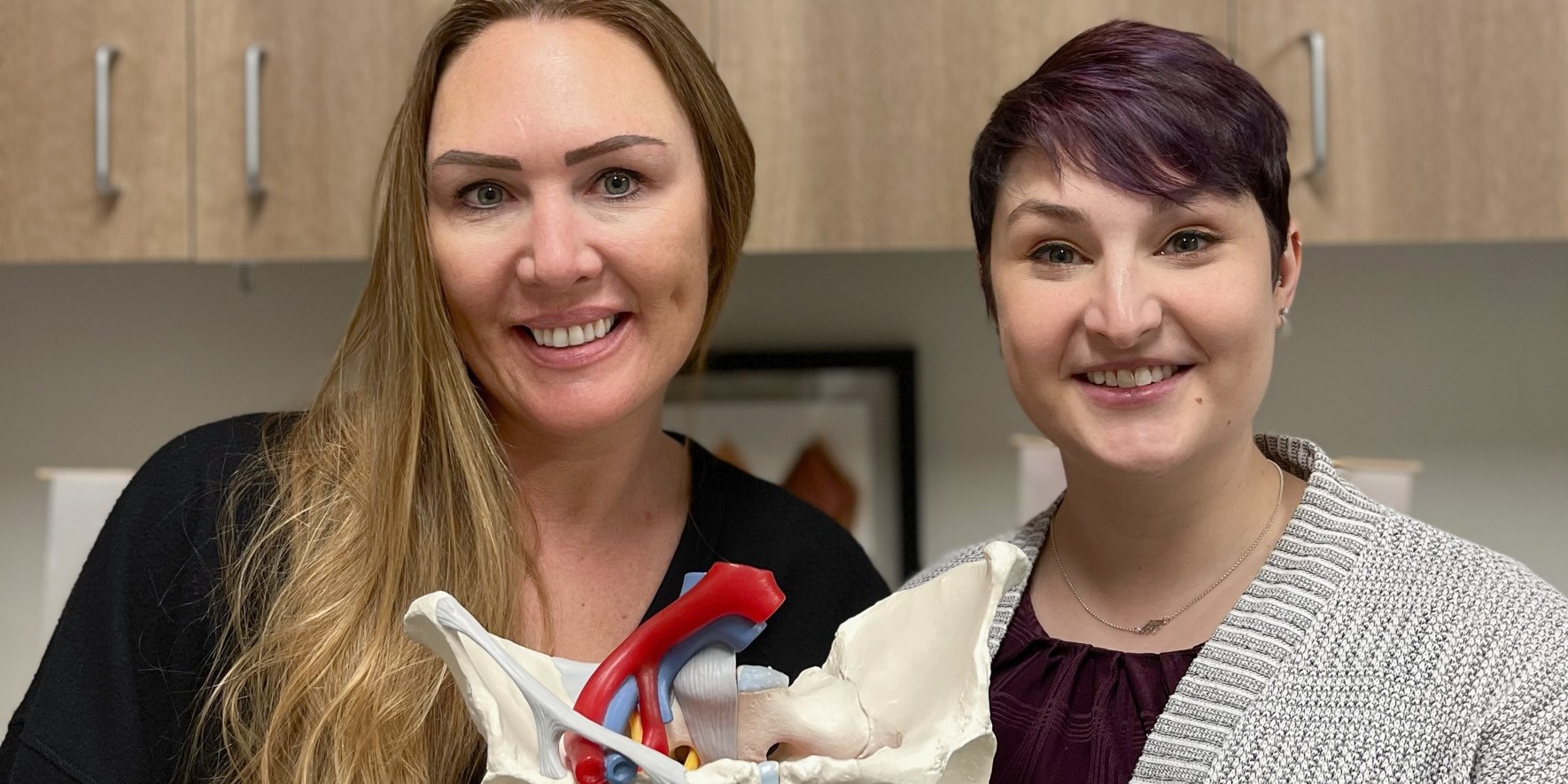Wendy Sword, Professor in the School of Nursing at McMaster University, and her colleagues have recently published a study in which they looked at the relationship between mode of delivery and risk for post-partum depression. An interesting correlation that the authors found shows that having urinary incontinence in the first 6 weeks after childbirth doubles the risk for having post-partum depression. In McMaster University's post about this research, it is pointed out that up to 20% of new mothers experience post-partum depression, and this can interfere with the mother's self-care, with bonding between the mother and child, and with the care needed by the infant. Early detection and treatment of post-partum depression is critical.
In this research, 1900 new mothers were studied, up to 1/3 of them had c-sections as the mode of delivery. At 6 weeks post-partum, nearly 8% of the mothers had post-partum depression. The depression was not identified as being related to one mode of child delivery over another. The 5 strongest predictors of post-partum depression were identified as: 1) mother's age less than 25, 2) mother requiring hospital readmission, 3) non-initiation of breast-feeding, 4) good, fair, or poor self-reported health by the mother, and 5) urinary incontinence.
Dr. Sword recommends that providers ask patients about continence status early in the post-partum period, as patients may be embarrassed to bring it up, and also because incontinence is often dismissed as a common issue post-partum that will likely improve. When patients are referred to rehabilitation for continence issues, we often find that the symptoms have persisted for years, sometimes decades, unfortunately. During our marketing visits and education of the community, we can also encourage patient providers to send the patients to rehabilitation as early as possible. It is often at the 6 week appointment that the patient can be screened for such concerns, and this is when many of our referrers are comfortable sending a patient in for a check of the pelvic muscles.
Appearing in Medscape this week is an important message from the Centers for Disease Control and Prevention (CDC). Gail Bolan, MD, of the Division of Sexually Transmitted Disease (STD) Prevention, speaks about the importance of skilled sexual health interviewing and teaching on the part of the medical provider. Her message is directed towards a provider interviewing an adolescent, however, her points are very relevant for all of us in health care who wish to ask respectful and meaningful questions regarding a patient's sexual health.
Dr. Bolan recommends that we avoid assumptions about the patient's sexual orientation, behaviors, or number of partners. Using gender-neutral language may be important, and you can take cues from the patient in order to use consistent language. Being nonjudgmental and supportive is also important, and we may need to become more comfortable ourselves with topics related to sexual function.
The article continues to recommend using the "5 Ps" when taking a sexual history. The "Ps" stand for: partners (learning the number, sex, and current sex partner history), practices (does the patient engage in anal, vaginal, or oral sex), protection from STD's (condom use or use of other forms of birth control), past STD history (the patient's or the partner's history of STD), pregnancy prevention (is the patient trying to get pregnant or needing to discuss birth control).
The above description of sexual history may be most relevant for a medical provider for the purposes of ruling out disease risk and need for further care. However, many of these questions are very important for the pelvic rehab therapist to be able to ask. For example, although we use standard precautions, if a patient is dealing with a current STD, internal treatment may be inappropriate for both the patient and for the therapist. If a female patient is trying to get pregnant, certain therapies are contraindicated, so it is helpful for us to know that we should check in with patient status.
It is always appropriate to use language the helps a patient feel most comfortable, and this includes avoiding assumptions about marital status, gender of a patient's partner, and sexual behaviors in which a patient engages. Many of us were not prepared for having such intimate discussions with our patients, and it can challenge our own belief systems and create feelings of discomfort or uncertainty. It is helpful to have resources including mentors or colleagues to discuss these issues with when they do occur.
In the world of pelvic rehabilitation, it is rare that we meet a patient who has an isolated issue. More often we hear complaints about not only bladder dysfunction, but also about bowel dysfunction, sexual health issues, and pain. Irritable bowel syndrome (IBS) is one diagnosis that shows up on many of our patient intake forms and will be identified as constipation-dominant, diarrhea-dominant, or as having both conditions. Much of the recent research regarding IBS reiterates the fact that the cause of IBS us unknown, that it is a functional gastrointestinal disorder, and that the diagnosis is made based on clinical symptoms rather than a test. Some patients have responded favorably to trials of certain antibiotics, but the medical community continues to struggle with a cure for this painful, distressing condition.
I was very pleased to see an article that proposes a biopsychosocial model for IBS. There is increasing interest in and awareness of the relationships between the brain and the gut. In this article, the authors discuss issues of life stress, history of abuse, parental patterns of "illness behavior", coping mechanisms, in addition to gut physiology. Although the authors do not recognize the role of physical therapy in treating IBS, it is stressed that providers must develop strong rapport with patients so that clear communication is available. It is then much easier for some of these challenging topics to be discussed and for strategies to be put in place. In addition to pharmacology, the authors suggest that psychotherapy may play a larger role in helping patients with IBS to heal.
Many of our patients do recognize that stress is a major factor that worsens pain and bowel dysfunction. Pelvic rehabilitation specialists are equipped with tools to help teach patients how to decrease the physiological sequelae of stress through skills such as breathing, contract-relax, physiologic quieting, and other means. If you are interesting in learning more about treatment of bowel conditions such as IBS, that information is covered in the Level 2A courses.
After reading a Medscape article about compassion fatigue and cancer care, it seemed appropriate to bring up the topic for pelvic rehab therapists and providers. In the article, burnout is described with phrases such as overwhelming exhaustion, detachment from job, and a sense of ineffectiveness. Compassion fatigue, while being associated with burnout, is related more directly to being in a role of helper to those in distress, thereby creating tension and distress for the one giving care. Health care workers are believed to be a vulnerable group for this compassion fatigue.
Many of the pelvic rehab therapists I have met over the last decade describe the challenges of working with this rewarding, yet challenging population. Patients with chronic pelvic pain are particularly in need of a listening ear and also require a significant amount of case management, hands-on rehabilitation, and encouragement. All of these factors can lead to increased work task burden for the therapist as well as psychological burden from carrying the weight of the patient's suffering. It then becomes important to "heal the healer" as described in this family practice article.
There are some resources in place at various work sites, such as employee assistance programs that provide a few visits to a counselor, and these should be used readily as the visits are usually free to an employee. The life skill of self-care does become the responsibility of the care provider, however, and in order to take care of ourselves the basic (but difficult to achieve) balance can be maintained by good nutrition, breaks from work (not documenting through lunch), having our own social support, and getting sleep and exercise.
You can take a Compassion Fatigue self- test, or the Professional Quality of Life (ProQOL) testhere.There are resources to combat burnout, one of the latest that I've seen is a book by Joan Borysenko, PhD. Check out her book Fried: Why You Burn Out and How To Revive.Another book that is clear in practical suggestions is The Art of Extreme Self-Care by Cheryl Richardson. You may also find support within the pelvic rehab community, as the therapists who have similar jobs truly understand some of the challenges as well as the rewards of our meaningful work. It is the hope of the Pelvic Rehab Institute that therapists continue to look towards the Institute to provide such support and a sense of community.
In a study that was originally published in Alimentary Pharmacology and Therapeutics, researchers correlated self-reported irritable bowel syndrome (IBS) with symptoms of urinary incontinence, pelvic organ prolapse (POP), sexual function, and quality of life (QOL.)
In a population of more than 2100 female patients, the reported incidence of IBS was nearly 10%. Within these women, an increased risk of bother from prolapse and sexual dysfunction was reported as well as a decrease in quality of life scores. The authors point out the hypothesis that frequent bouts of constipation may lead to weak pelvic floor muscles, and therefore increased pelvic prolapse, but this remains to be proven in the literature.
This study is meaningful not only because it evaluates information about a large group of women, but also because the population is a diverse group between the ages of 40 and 69. As IBS according to the ROME III can be further divided into constipation-dominant, diarrhea-dominant, or both, it makes sense that pelvic floor dysfunction is correlated to the diagnosis. Many patients who experience loose stool with IBS may unknowingly tighten the pelvic floor chronically to avoid leakage, and this in itself could lead to pelvic muscle tension and dysco-ordination as we see in many of our patients. Those patients who experience constipation and straining may also interfere with healthy muscle activity and create prolonged stress on the supporting tissues in the pelvis and pelvic floor.
The relationships pointed out in this study remind rehabilitation experts that it is important to ask detailed questions about all aspects of a patient's pelvic health, from sexual function to bladder or bowel function. This study is now available in PubMed Central, where you can find free, full-access articles.
Abdominal adhesions following surgeries can lead to pain with bowel function or general movement. This study aimed to assess whether or not a specific manual therapy approach could reduce the prevalence of such painful adhesions.
Researchers using an experimental animal model did in fact report benefits from applying post-operative visceral mobilization (VM). 3 groups of 10 rats were examined post-mortem at 7 days following an adhesion-producing surgery. The rats in the Lysis group were treated (unsedated) on day 7 only, while the Preventive group animals were treated daily beginning the day after surgery.
The severity and the number of adhesions were significantly lower in the Preventive group. Clear signs of disrupted adhesions were noted in both the Preventive and Lysis groups. The authors in this study conclude that pending further studies, “…visceral mobilization could readily be implemented into post-surgical care and patient education.” They propose that VM could aid in preventing and/or treating abdominal adhesions.
This is a very well cited study that describes the available literature in reference to abdominal surgery and adhesions. Although an animal model was utilized, the authors believe that the assessment and treatment to the animals creates an environment that encourages tissue mobility and discourages fibroblast invasion of the peritoneal tissues in the same manner as human tissues would react.
You can check out coursework that the Institute offers that focuses on visceral mobilization for patients with pelvic issues.
Perhaps an important message to take from this research is that in our clinical experiences patients rarely respond equally to the same dietary factors. Some of our patients cannot, despite vigorous logging of food and beverage intake, find a consistent association between certain foods or fluids and their bladder symptoms. Even though some of our patients may benefit from reducing coffee and teas, we can appreciate that at least in Japan, where this information was gathered, a diet that includes green tea may not necessarily contribute to bladder issues.
By accepting you will be accessing a service provided by a third-party external to https://www.hermanwallace.com/










































